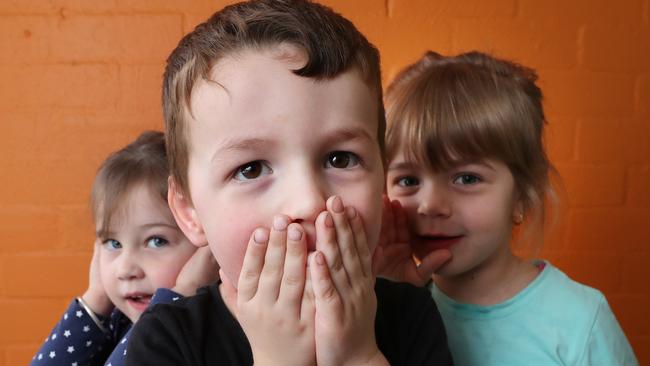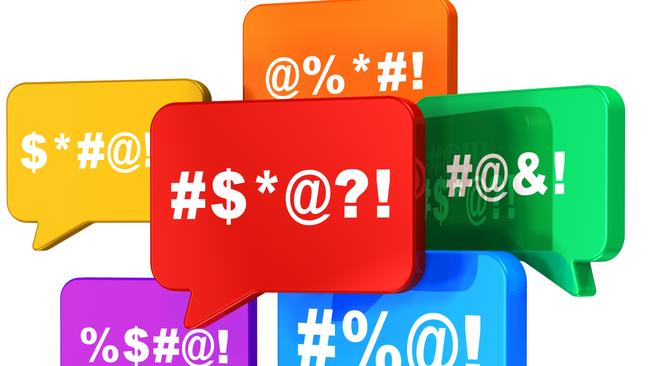Teaching kids to swear is a &%$! dumb idea
THE modern world is already forcing kids to grow up too quickly. Let’s not speed up the process any more by teaching them to swear, writes Karen Brooks.
Rendezview
Don't miss out on the headlines from Rendezview. Followed categories will be added to My News.
THE adage, “children should be seen and not heard” has been consigned to the dustbin of anachronisms.
Even so, there are those who would argue that kids nowadays have far too much to say.
Imagine then if we listened to neuroscientist, Dr Emma Byrne, author of the book Swearing is Good for You: The Amazing Science of Bad Language, and taught young kids to use a range of swear words.
I can hear you now. You’re thinking, WTF?
This isn’t about parents accidentally or purposefully cussing in front of their kids and then, maybe, laughing or being mortified when their toddler repeats it — especially in public. This is about teaching them expletives and their meaning.
Byrne claims that just as it does for adults, allowing kids to swear, instructing them how, can ease tension, express and deflect anger and improve a vocabulary.
It can also help them with social interactions. Really?
There’s a reason swearing, particularly dropping the F and C bombs as well as all the other colourful words we use to express a range of emotions aren’t always appropriate — particularly when they come out of kids’ mouths.
People negatively judge not only the cursing child but the parents as well.
Broadcasters don’t swear because they’re aware it may offend people. Likewise, people in public spaces generally curb their language out of respect for those sharing it — even those with potty mouths.

Creative writers deliberately use swearing to shock, make an audience/reader uneasy and as a shortcut to say something about a character: they’re rebellious, aggressive, funny, unable to express themselves in any other way; highly intelligent and/or deliberately offensive etc.
Byrne’s suggestion we teach kids to explore their inner Russell Brand has received mixed responses with most people canning the idea. However, there are other parents (mainly mums) relishing the suggestion and in the process saying they’ll make sure their children also understand the affect swear words can have on people.
Other mums say they have more to worry about than a few f**king words.
So, prepare for children to be seen and bloody well heard.
Some parents quite rightly point out there are much worse words anyhow — like “bitch” and “hate”. I agree — so teach your kids not to use those either and to understand the terrible power they wield.
Which leads me to something else I think this latest science demonstrates: the way in which the boundaries between childhood, teenage-hood and adulthood are all blurring.
Whereas once there were significant rites of passage such as when you started school, commenced high school, menarche, your voice broke, first shave, first date, school formals, graduation, first job, driver’s licence, casting first vote etc. their real importance is diminishing.
Sure, many are still celebrated only, if anything, we now go over the top. Mostly with stuff that can be posted and shared on social media and in which, unlike voting, our kids “star”.
For example, children now “graduate” from preschool or kindergarten and primary with all the various bells and whistles. Cute, maybe. But it means by the time they get to a really significant graduation such as high school or university, they’ve already done it — a few times.

Remember when a life-stage was also marked by a humble and personal memento?
Swearing was also, once, a kind of rite of passage. Using an expletive without getting into trouble was one of those unspoken agreements that you were now an adult.
Prior to that, you were taught not to swear and, if you weren’t, somehow knew in the way kids do, what words were forbidden, “naughty” — usually from the reaction they garnered. These words were to be savoured, used sparingly and away from grown-ups.
It’s an early lesson in the power of language.
Learning to curb usage, being told you shouldn’t swear and why, and to find another word, teaches a child about boundaries, manners, respect, restraint — for others and the self — and instils a sense of social responsibility and awareness.
It doesn’t mean kids won’t swear or learn the words — of course they will. But if we teach them to from a young age then what do we really gain? All the other important lessons — some which occur organically — are potentially lost.
We’re turning our children into kidults in so many ways. We’re denying them the right to enjoy childhood, to be protected from adult notions and decisions until they’re ready to process and deal with the consequences.
This includes teaching kids it’s all right to drop the F bomb.
Swearing has always been an adult choice — not one for kids to make yet — and that’s OK.
While this is a great discussion to have, it’s another step on an already slippery slope that’s seeing the erosion of childhood.
But it is helping a neuroscientist sell a book.
Karen Brooks is a Courier-Mail columnist.


